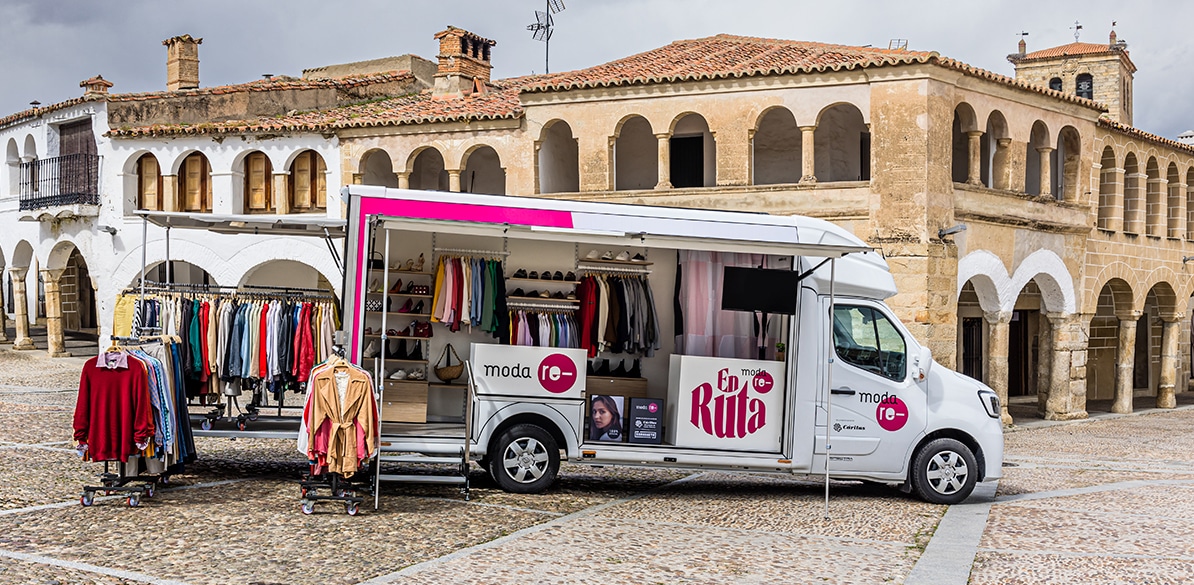Moda re-
Recipient of the Award for the Project or Initiative with the Best Social Impact

Our panel has presented Moda re- the Award for the Project or Initiative with the Best Social Impact, an annual recognition that celebrates the social initiative that has had the greatest impact on diverse aspects of our society.
With the increasing negative environmental impact of the textile industry, social awareness of the importance of recycling and reusing clothes is growing. Moda re-, an innovative project from Cáritas, is based on the circular economy and promotes conscious, sustainable and responsible consumption in our society.
The impact of Moda re- reaches beyond the environment; it is also a benchmark in terms of social employment generation in Spain, establishing itself as a great model to follow.
What is the Moda re- project from Cáritas?
The Moda re- cooperative stands out for its pioneering role in the transformation of recycling in the textile field and in the generation of social employment. Every year, this entity collects millions of kilos of second-hand clothing, footwear and accessories through its containers located in the streets of our cities. After a meticulous selection process, the clothes are treated in its integrated waste management plants and sold in Cáritas second-hand stores.
Its activity not only contributes to recycling, but also promotes the workplace integration of people in situations of social exclusion who participate in Cáritas’ support programs. Today, Moda re- brings together 50 job placement agencies and provides more than 1,400 jobs.
Moda re-, a model of the circular economy and solidarity
It has established itself as a leader in the collection and management of used clothing in Spain, in 2023 achieving the impressive figure of more than 44 million kilos of textiles collected through its more than 8,200 containers. The garments selected for a second life are sold at its 170 points of sale in 90 Spanish cities, where people in vulnerable situations can acquire them free of charge.
The cooperative has the four most advanced sorting plants in southern Europe, which has allowed it to prevent the emission of nearly 3 million tons of CO2 and save more than 400 million cubic meters of water.
Moda re- also leads initiatives to raise awareness about the importance of recycling and reuse, such as its traveling store, “Moda re- en Ruta”, which takes second-hand clothing to rural areas and educates people about sustainability in communities where these resources are less easily accessed.
In addition, Moda re- organizes sustainable fashion events, creative recycling workshops and collection campaigns in collaboration with companies and schools, promoting responsible consumption practices and offering textile products a second life.
Workplace inclusion through Moda re-
Beyond its environmental impact, Moda re- also promotes employment opportunities. Of the 1,400 jobs generated to date, more than half (55%) are filled by people at risk of social exclusion, who benefit from training and employment programs.. More than 60% of those who have participated in its program are able to access stable employment.
The goal is that more and more people in vulnerable situations or at risk of social exclusion can work in Moda re-, thereby giving them the skills they need in the conventional job market.
Cáritas’s commitment to responsible fashion
Through this initiative, Cáritas has transformed the management of used clothing, not only facilitating workplace insertion, but also dignifying the process of acquiring clothes for those who need them. At Moda re- outlets, people can obtain quality clothing at no cost, just as if they were customers, but free of charge.
Aware of the environmental impact of the textile industry, Cáritas promotes a sustainable and circular model that combats the effects of fast fashion. Each cotton T-shirt requires 2,700 liters of water, and dyes contribute to 20% of global drinking water pollution.
By breathing new life into used clothing, Cáritas is moving towards a fairer and more inclusive society while protecting the environment at the same time.
